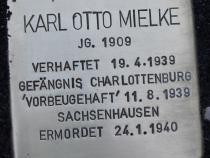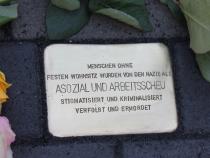Location
Alexanderplatz
District
Mitte
Stone was laid
21 April 2016
Born
27 March 1909 in Berlin (ungesichert)
Verhaftet
April 1939 to 11 August 1939
in
Gerichtsgefängnis Charlottenburg
Deportation
on 11 August 1939
to
Sachsenhausen
Murdered
24 January 1940 in Sachsenhausen
Karl Otto Mielke was born the son of Elisabeth and Richard Mielke, probably in Berlin. Little is known of his life. He married Erna König from whom he later separated for unknown reasons. He was periodically employed as a construction worker.
He lost his job in the 1930s. The employment office sent him to work for the company Familie E. Hegerfeld Industriebau Essen GmbH. He started working for this company at a race course in Spandau on 13 December 1938.
No details of the working conditions there are known, but soon his appearances for duty became irregular. On 1 April 1939, he was fired for alleged “disinclination to work”, which his employer did not fail to report to the employment office in Neukölln.
In the ensuing months, Karl Otto Mielke performed casual work. With no documents to prove his place of residence, he was categorized homeless. While still working at the construction site, he had occasionally slept in a hostel for the homeless at Büschingstraße 4 in Berlin-Friedrichshain. Records also show that he sometimes slept in the municipal shelter at Nordmarktstraße 15. The needy were only permitted to stay a few days at a time here.
Without a permanent workplace or residence, Karl Otto Mielke was categorized by the Nazis as “workshy and asocial”, signalling his exclusion from the “people’s community” and making him a target of persecution. As such, he was sought by the authorities from early April 1939. The police apprehended him after just a short time (probably as soon as 19 April). He was held in pre-trial detention in Charlottenburg court prison, and subsequently pleaded guilty to a charge of “idling” – an offence that the Nazis had invented to criminalize those who resisted the new labour standards. On grounds of this offence against the Four-Year Plan, with which the Nazi leadership aimed to get Germany swiftly ready for war, he was sentenced to two months’ imprisonment, offset by the period spent in remand, pending trial.
But after completing his sentence he was not released. The criminal police kept him in “preventive detention”. From 11 August 1939 on, he was imprisoned in Sachsenhausen concentration camp. He was given the prisoner number 1872, registered as a “workshy” or “asocial” prisoner, and assigned to block 68. No details of his time in the concentration camp are known. But “asocial” prisoners were low down in the concentration camp hierarchy and denied any form of support or even slight relief.
In the end, Karl Otto Mielke was held in block 18 of the part of the concentration camp known as the “new camp”. This is where he died, on 24 January 1940. The SS gave the empty phrase “physical weakness” as his cause of death.
He lost his job in the 1930s. The employment office sent him to work for the company Familie E. Hegerfeld Industriebau Essen GmbH. He started working for this company at a race course in Spandau on 13 December 1938.
No details of the working conditions there are known, but soon his appearances for duty became irregular. On 1 April 1939, he was fired for alleged “disinclination to work”, which his employer did not fail to report to the employment office in Neukölln.
In the ensuing months, Karl Otto Mielke performed casual work. With no documents to prove his place of residence, he was categorized homeless. While still working at the construction site, he had occasionally slept in a hostel for the homeless at Büschingstraße 4 in Berlin-Friedrichshain. Records also show that he sometimes slept in the municipal shelter at Nordmarktstraße 15. The needy were only permitted to stay a few days at a time here.
Without a permanent workplace or residence, Karl Otto Mielke was categorized by the Nazis as “workshy and asocial”, signalling his exclusion from the “people’s community” and making him a target of persecution. As such, he was sought by the authorities from early April 1939. The police apprehended him after just a short time (probably as soon as 19 April). He was held in pre-trial detention in Charlottenburg court prison, and subsequently pleaded guilty to a charge of “idling” – an offence that the Nazis had invented to criminalize those who resisted the new labour standards. On grounds of this offence against the Four-Year Plan, with which the Nazi leadership aimed to get Germany swiftly ready for war, he was sentenced to two months’ imprisonment, offset by the period spent in remand, pending trial.
But after completing his sentence he was not released. The criminal police kept him in “preventive detention”. From 11 August 1939 on, he was imprisoned in Sachsenhausen concentration camp. He was given the prisoner number 1872, registered as a “workshy” or “asocial” prisoner, and assigned to block 68. No details of his time in the concentration camp are known. But “asocial” prisoners were low down in the concentration camp hierarchy and denied any form of support or even slight relief.
In the end, Karl Otto Mielke was held in block 18 of the part of the concentration camp known as the “new camp”. This is where he died, on 24 January 1940. The SS gave the empty phrase “physical weakness” as his cause of death.




